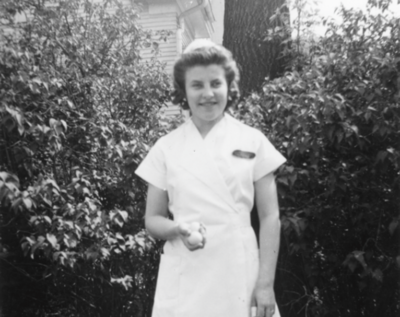Clay County Histories
Markus Krueger | Program Director HCSCC
Moorhead’s old Fairmont Creamery building on the corner of 8th Street and 2nd Ave N turns 100 this year, and it is going through quite a change. Developer Kevin Bartram is converting the former creamery-turned-retirement home into 36 apartments. The work is scheduled to be finished this Fall.
The Fairmont Creamery produced butter, milk, eggs, cheese, and poultry in this building for the Red River Valley market starting in 1924 until it closed in 1980, but when I see this old building, I always think of World War II. In February of 1942, just a couple months after the attack on Pearl Harbor, the Fairmont Creamery got a government contract to produce powdered eggs for the war effort. By 1943, Moorhead’s plant alone was producing half a million dried eggs per day while continuing to produce butter and milk and eggs for local civilians.
Adeline Oscarson was one of the 100 women hired to crack eggs for $12 per week during the war (with the men called to duty, 75% of Fairmont’s wartime workforce were women). Adeline recalled in an interview: “We had long tables and there were girls on both sides of the table….they were the ones who broke the eggs…There was a pulley up above us, and you’d take down a basket of eggs and it had 12 dozen in it….And we picked up two eggs at a time and break it into one cup. And then we’d take another two eggs and break into this [other] cup. And then we’d put the cups out like this and sniff on it. But they had been candled already, so we should never get a spoiled egg.”
The buckets of eggs were emptied into a mixing machine that scrambled the whites and yolks together. The mixture was pressurized and sprayed into a fine mist that was blasted with hot air that dried the egg mist within 10 seconds. The dried eggs were moved by conveyor to a sifter that broke up any clumps. When it came out of the sifter, it was packaged into parchment lined boxes.
Powdered eggs are easier to ship overseas than what comes right out of the chicken. They are lighter, they don’t break, and they don’t spoil, so they were perfect for shipping all around the world to feed American servicemen and our allies. Norris Grefsrud was a young Rollag-area farmer who was bound for the big invasion of Japan. On his boat in the Pacific, he found out that Japan surrendered and the war was over. Norris was part of the post-war US occupation force of Japan, and he wrote this letter home to his sister Thelma dated November 12, 1945.
“Say, I was on K.P. [Kitchen Patrol] yesterday and was working there when the supplies came in and do you know what? There was one case of powdered eggs that was from Fairmont Creamery Co. Moorhead, Minn.!! Imagine that will you!! I’m probably eating eggs from our own Chickens over here, ha!”


